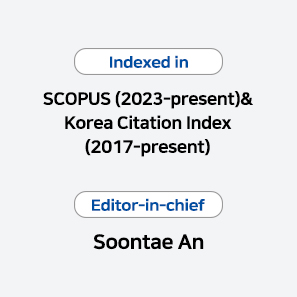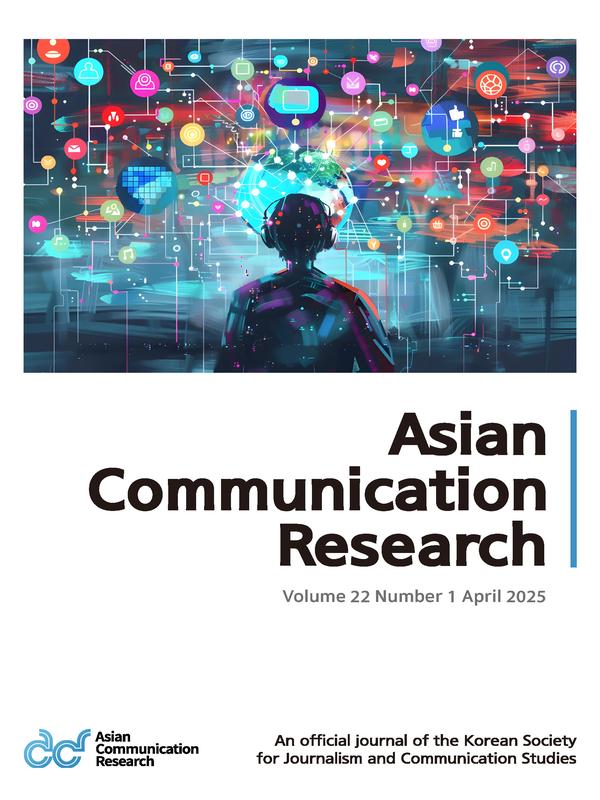| About ACR | Editorial Board | Guide for Authors | View Articles | Submit Manuscript |

Sorry.
You are not permitted to access the full text of articles.
If you have any questions about permissions,
please contact the Society.
์ฃ์กํฉ๋๋ค.
ํ์๋์ ๋ ผ๋ฌธ ์ด์ฉ ๊ถํ์ด ์์ต๋๋ค.
๊ถํ ๊ด๋ จ ๋ฌธ์๋ ํํ๋ก ๋ถํ ๋๋ฆฝ๋๋ค.
Guide for Authors
Ethical Guidelines and Editorial Policy
General Information
The guidelines of research and publication ethics are intended to define the principles and standards of research and publication ethics to be noted by the authors, reviewers, and editors of Asian Communication Research (ACR). Authors who want to publish their manuscripts in the ACR should be aware of the guidelines, and submit only the research achievements that ensure research integrity. The authors also should cooperate in the procedures and requirements necessary for verifying the research integrity of research achievements. The guidelines are largely derived from Principles of Transparency and Best Practice in Scholarly Publishing. For the ethics policies not stated here, the general guidelines of Committee on Publication Ethics (COPE) can be applied. COPE guidelines for peer reviewers lay out the basic principles and standards for all peer reviewers and can be found at the following link:
https://publicationethics.org/files/Ethical_guidelines_for_peer_reviewers_0.pdf.
Peer-review Process
ACR follows a double-blind peer review process. Peer review is significant in ensuring the integrity of the scholarly record. The process requires that everyone involved behaves responsibly with integrity and trust. Peer reviewers play a central role in the peer-review process, but too often come to the role without any guidance on their ethical obligations. Please read the guidelines before accepting or declining our invitation to review. The following is a general summary of the peer-review process:
Screening before review
When a manuscript is received through the online review system, it is screened for the aims and scope of the ACR by the editors, and if it is judged as not appropriate for the ACR, it is returned to the authors.
Assignment and ethics for reviewers
Expert reviewers are selected from the list of reviewers recommended by the associate editor of the academic area, and asked to review a manuscript. The reviewers shall follow the ethics guideline for reviewers:
- The reviewers shall examine the papers commissioned by the editors of ACR according to the peer review policy of ACR and notify the editors of the review results. If the reviewers believe that he or she is not a good candidate for reviewing a paper, he or she may notify the editors to evade the review;
- The reviewers shall evaluate the article justly based on objective criteria, regardless of their personal academic beliefs or relationship with the authors;
- The reviewers shall immediately notify the editors when he or she finds that the paper to be reviewed has already been published or when he or she finds a problem related to research misconduct;
- The reviewers shall not disclose the details of the paper reviewed. Additionally, the reviewers should not cite the content of the paper or disclose the review results without the author's consent before the paper is published in ACR.
Decision on acceptance of the manuscript
After review, the editors make a decision on the acceptance of the manuscript based on the results of the review by one of the following: Accept, Accept with Revision, Revise and Resubmit, or Rejection.
Copyright
The authors of the article hereby agree that the Korean Society for Journalism and Communication Studies (KSJCS) holds the copyright on all submitted materials and the right to publish, transmit, sell, and distribute them in the journal or other media. The contributors should submit the Copyright Transfer Agreement for publication of the manuscript.
Privacy Statement
Personal information such as names and e-mail addresses reported to ACR will be used exclusively for the stated purposes of ACR and will not be made available for any other purpose or to any other party.
Authorship
Authorship credit should be based on a) substantial contributions to conception and design, acquisition of data, or analysis and interpretation of data; b) drafting the article or revising it critically for important intellectual content; c) final approval of the version to be published, and d) agreeing to be accountable for all aspects of the work in ensuring that the questions related to the accuracy or integrity of any part of the work are appropriately investigated and resolved. Authorship should meet these four conditions.
Complaints and Appeals
Authors, reviewers, and readers may register complaints and appeals in a variety of cases as follows: falsification, fabrication, plagiarism, duplicate publication, authorship dispute, conflict of interest, copyright, stolen data, defamation, and legal problem. If any individuals or institutions want to inform the cases, they can send a letter via the contact page on our website. For the complaints or appeals, concrete data with answers to all factual questions (who, when, where, what, how, why) should be provided. The editor-in-chief and editors are responsible for handling any complaints or appeals. The consequence of remedy depends on the type or degree of misconduct. The consequence of resolution will follow the guidelines of the COPE.
Conflict of Interest
Conflict of interest exists when an author or the authorโs institution, reviewer, or editor has financial or personal relationships that inappropriately influence or bias his or her actions. Any types of conflicts of interest (e.g., source of funding, paid consultant to sponsor, etc.) should be declared by the authors. If there are any conflicts of interest, authors should disclose them in the manuscript. The conflicts of interest may occur during the research process as well; however, it is important to provide disclosure. If there is a disclosure, editors, reviewers, and readers can approach the manuscript after understanding the situation and the background of the completed research.
Informed Consent
All research involving human subjects must adhere to strict ethical standards. Written informed consent forms must be obtained from participants, and copies of these consent forms should be retained by the researchers. Researchers must provide documentation of approval by the Institutional Review Board (IRB) affiliated with the author(s)' institution. This documentation may include a certificate, agreement, or formal approval from the IRB. The authors are expected to report on the IRB approval in the methods section of the manuscript. In cases where questions arise regarding IRB approval or study conduct, the editor or reviewers may request copies of these documents for review and resolution.
Feedback after Publication
Any opinion or inquiry during the process of the publication including peer-review can be addressed to the editor-in-chief. Authors also can show complaints and appeals regarding the review results to the editor-in-chief. Authors are not allowed to contact the reviewers, of whom they have no information. If the authors or readers find any errors, or contents that should be revised, it can be requested from the editors. The editors may consider erratum, corrigendum, or a retraction. If there is a readerโs opinion on the published article in the form of a letter to the editor, it will be forwarded to the authors. The authors can reply to the readerโs letter. Letter to the editor and the authorโs reply may also be published.
Publication Misconduct
The followings are the general summary of research and academic misconduct, which is prohibited by ACR:
Redundant (duplicate) publication
Authors should not submit their research to more than one journal at the same time, and in principle, articles published in ACR cannot be duplicated elsewhere. The use of previously published data or research results without citation of sources or double publication without prior consent is prohibited. The abbreviation or part of the dissertation and the revision of conference paper should be stated.
Plagiarism
Any conduct that uses the research results of others without specifying the source is considered as plagiarism and prohibited in ACR. The examples of plagiarism include a) the act of using the research content of others' works in whole or in part without revealing the source; b) the act of not revealing the source while partially using the word or sentence structure of another person's work; c) the act of not displaying the source while using the original ideas and expressions of others; d) the act of not indicating the source while translating and using others' works.
Fabricated data
The act of manipulating data that does not exist in the experiment and analysis results.
Modulation
The act of modifying the research results by manipulating research materials or by arbitrarily modifying or deleting research results.
Inappropriate authorship
The act of granting authorship to a researcher without a justifiable reason or to a person who has no academic contribution.
Sanctions and Follow-up Measures for Inappropriate Conduct of Research
When the journal faces suspected cases of research and publication misconduct such as redundant publication, plagiarism, fabricated data, modulation, inappropriate authorship, the resolution process will follow the processes by the Committee on Publication Ethics
(http://publicationethics.org/resources/flowcharts). The discussion and decision on the suspected cases are carried out by the Editorial Board.
The following sanctions may be imposed on authors who have been found to have acted improperly in conducting their research published in ACR.
- If the article has already been published, it will be removed from the published article list.
- The information about the article retraction will be posted on the website of ACR with the authorโs name(s), article title, and the volume and issue numbers.
- The authors will be prohibited from submitting manuscripts to ACR for three years.

| Editorsโ Pick | |||
|














